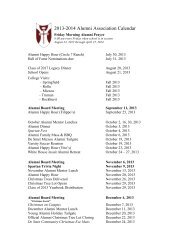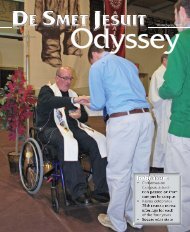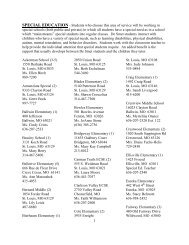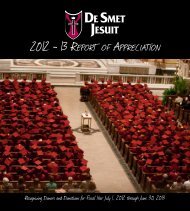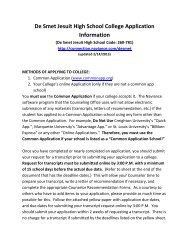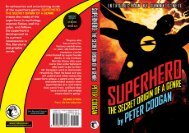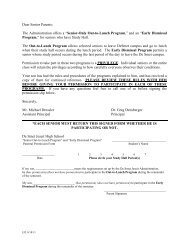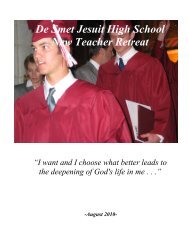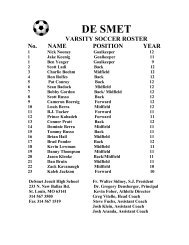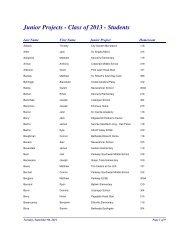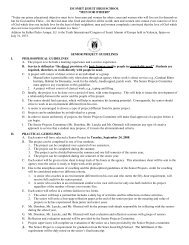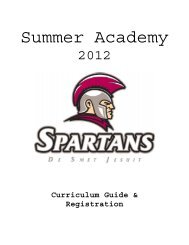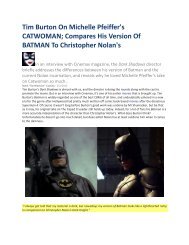Discussion Questions - Resources
Discussion Questions - Resources
Discussion Questions - Resources
You also want an ePaper? Increase the reach of your titles
YUMPU automatically turns print PDFs into web optimized ePapers that Google loves.
Old School – Tobias Wolff1. What is the effect of the first-person narrative style Wolff has chosen for this novel?What kinds of information --- or perspectives --- does the reader have access to? On theother hand, what kinds of information does first-person narration deny the reader? Whatterms might describe the narrator's voice? Why is this narrative style so appropriate forthis story?2. About his desire to win the competition that would give him an audience with RobertFrost, the narrator says, "My aspirations were mystical. I wanted to receive the layingon of hands that had written living stories and poems, hands that had touched thehands of other writers. I wanted to be anointed" [p. 7]. Is his aspiration admirable?What does the boy not understand about how one becomes a writer? How seriouslydoes he work at acquiring the skills of his craft?3. In social interactions between boys at the school, much is left unsaid. Why is this?Consider the relationship between the narrator and his roommate Bill White [pp. 11-13,139-40]. What problems of interpretation arise when so little talking is done? Why isthis relationship so problematic?4. During his visit to Gershon to explain his mistake in whistling the Nazi marching tune,the boy decides not to confide the fact that his father is Jewish. He thinks, "I'd letGershon think the worst of me before I would claim any connection to him, or implicatemyself in the fate that had beached him in this room. Why would I want to talk my wayinto his unlucky tribe?" [p. 23]. What does this episod --- including his meeting with theheadmaster --- tell us about the narrator?5. Very early on, the narrator tells us that the school adhered informally "to a system ofhonors that valued nothing you hadn't done for yourself." He goes on to say "DeanMakepeace had been a friend of Hemingway's during World War I and was said to haveserved as the model for Jake's fishing buddy Bill in The Sun Also Rises" [p. 4]. Whatseems here like casual exposition is seen later to be foreshadowing, linking the acts ofdeception committed by the boy and the headmaster. What other examples do you findof Wolff's careful attention to the structure of the novel?6. Having related his experience of Frost's poem "After Apple-Picking," the headmastertells the boys, "Make no mistake . . . a true piece of writing is a dangerous thing. It canchange your life" [p. 47]. Why is writing dangerous in this novel, and for whom?7. Reading The Fountainhead, the narrator says, "I was discovering the force of mywill. . . . I understood that nothing stood between me and my greatest desires ---nothing between me and greatness itself --- but the temptation to doubt my will andbow to counsels of moderation, expedience, and conventional morality, and shrink intothe long, slow death of respectability" [p. 68]. Why does Ayn Rand's writing have such apowerful effect on him, and why does his initial excitement fade upon actually meeting
the author? The boy also learns an important lesson when he rereads the stories ofHemingway, whom Ayn Rand has attacked as a creator of "weak, defeated people" [p.84]. What does he realize, and how is this lesson important for what happens later [pp.95-99]?8. As he looks toward graduation, the narrator says it was a "dream that produced theschool, not merely English-envy but the yearning for a chivalric world apart from the dinof scandal and cheap dispute, the hustles and schemes of modernity itself. As Irecognized this dream I also sensed its futility, but so what? . . . With still a month tograduation I was already damp with nostalgia" [p. 134]. If literature plays a critical rolein both the school's chivalric ideal and in the nostalgia the narrator feels, is literature analternate world in which the narrator would prefer to exist? What is ironic about theabove passage?9. Old School is in large part an examination of the process by which a boy tries tobecome the person he most desires to be. What does Wolff seem to suggest about theprocess of self-formation and the fragility of the ego?10. What is most impressive about the story "Summer Dance" and why does it appealto the boy so powerfully? Why in typing it does he feel "an intuition of gracious release"[p. 126]? Is this his moment of learning how to "begin to write truly" [p. 126]? Why is itimportant that he never considers his submission of the story --- with slight changes ---a deliberate act of plagiarism?11. The competitors for literary awards are all indebted to other writers: "All of us owedsomeone, Hemingway or Cummings or Kerouac --- or all of them, and more. Wewouldn't have admitted to it but the knowledge was surely there, because imitation wasthe only charge we never brought against the submissions we mocked so cruelly" [p.14]. Can it sometimes be difficult to draw a line between healthy imitation andplagiarism? Is the school's harsh response to the boy's use of another writer's storyunfair?12. Speaking of Old School in an interview, Tobias Wolff said, "For this novel to work,the reader has to believe in these boys becoming so madly passionate and competitiveabout this writing business. That can only happen when there is a complete failure ofperspective, which requires a very enclosed world, like an army or a priesthood. Greatmistakes can be made because the view becomes so narrow." How does Wolff createthis narrowed perspective? How do his choices of what to describe and what not todescribe shape the reader's perspective on the novel's events? To what degree does thereader's perspective merge with the narrator's?13. Tobias Wolff gives his readers an intimate view of his main character's faults. Howdoes your response to the boy change as the novel proceeds? What is the effect,particularly, of the last few chapters?14. In his review of the novel, Chris Bohjalian noted, "Virtually every chapter in thenovel could stand alone as a short story" (The Boston Globe, 4 Jan 2004, C7). DiscussWolff's attention to the dramatic tension and the formal structure of each chapter, and
decide whether you agree with Bohjalian's assessment that the novel is informed byWolff's experience as a master of the short story.15. The novel's epigraph, from a poem by Mark Strand, end with "the truth lies likenothing else and I love the truth." How does the epigraph relate to the narrator'sconfusion and his conflicts with himself?16. How does the narrator's meeting with Susan Friedman emphasize the differencebetween their characters and their approaches to the meaning and purposes of writing?Who is the more mature person? Each of them embodies certain ideals. What are theyand what is their essential difference?17. The book's final chapter departs from the narrator's story and moves to Mr.Ramsey's story about Dean Makepeace, who had allowed himself to be thought of as afriend of Hemingway. How does this story work as a coda to the novel? What is theeffect of the shift in perspective?18. In what ways is humor expressed in this novel, and what kind of humor is it? Whatsituations and descriptions are comical?19. If you have read Tobias Wolff's memoir This Boy's Life, how would you compare itto Old School? What is the difference between memoir and fiction, and how does thisquestion relate to the truth/lies dilemma presented by Old School?top of the page"Ingenious. . . . A tour de force. . . . Achieves a real profundity. "—The Boston Globe"Ingenious. . . . A tour de force. . . . Achieves a real profundity. "—The Washington Post Book World"The kind of deceptively quiet novel that deserves a second, slow reading. An homageto the power of story to move, to awaken and even to transform."—The Plain Dealer"Gentle, reserved, graceful. . . . Wolff again proves himself to be a writer of the highestorder: part storyteller, part philosopher, someone deeply engaged in asking hardquestions."—Los Angeles Times



